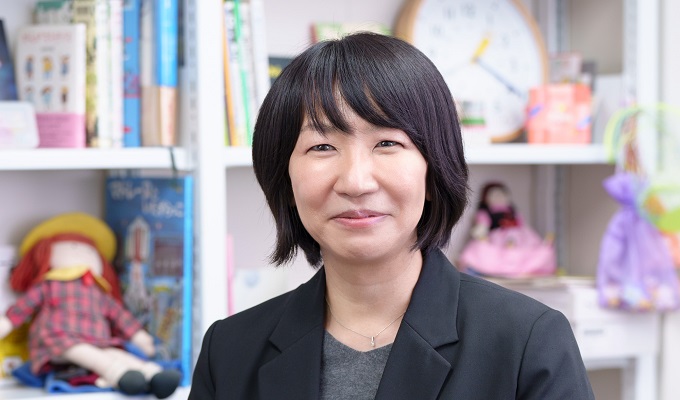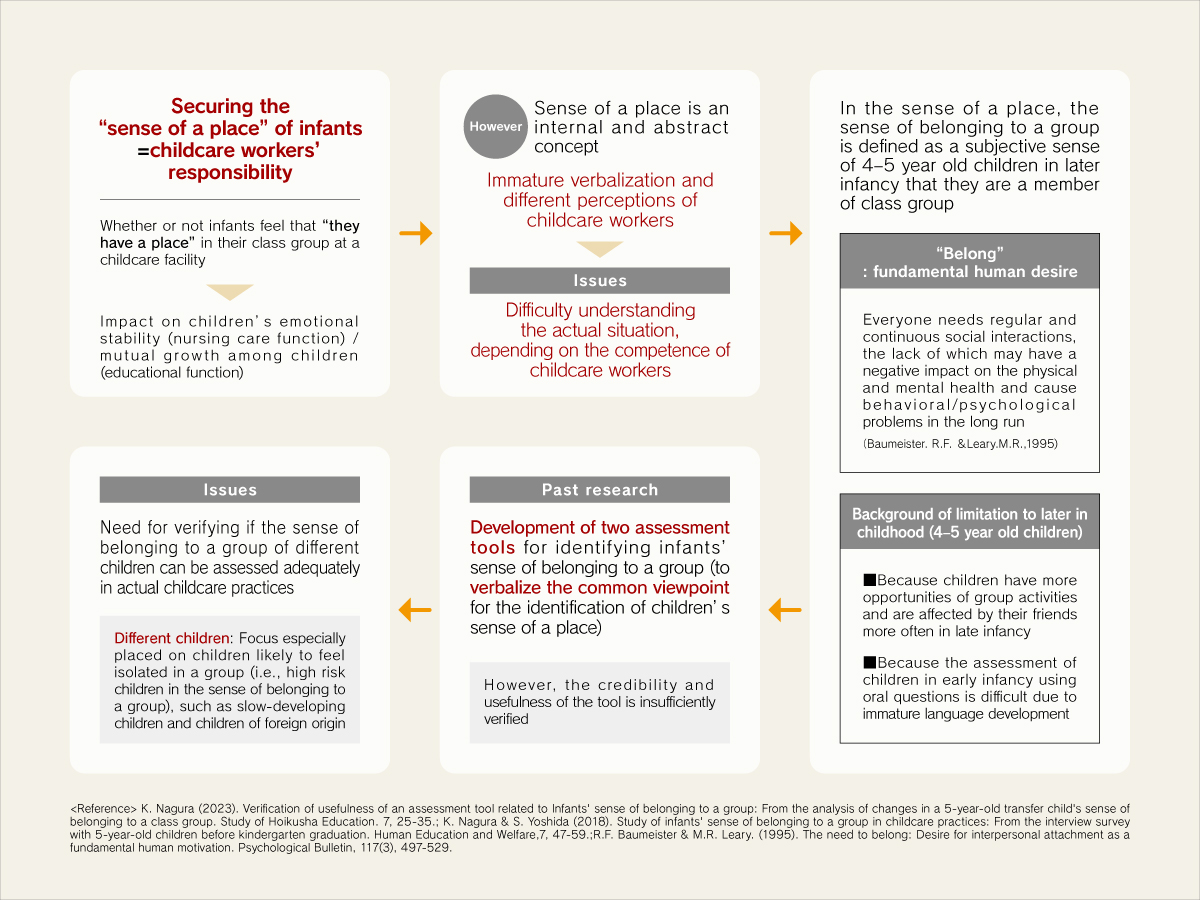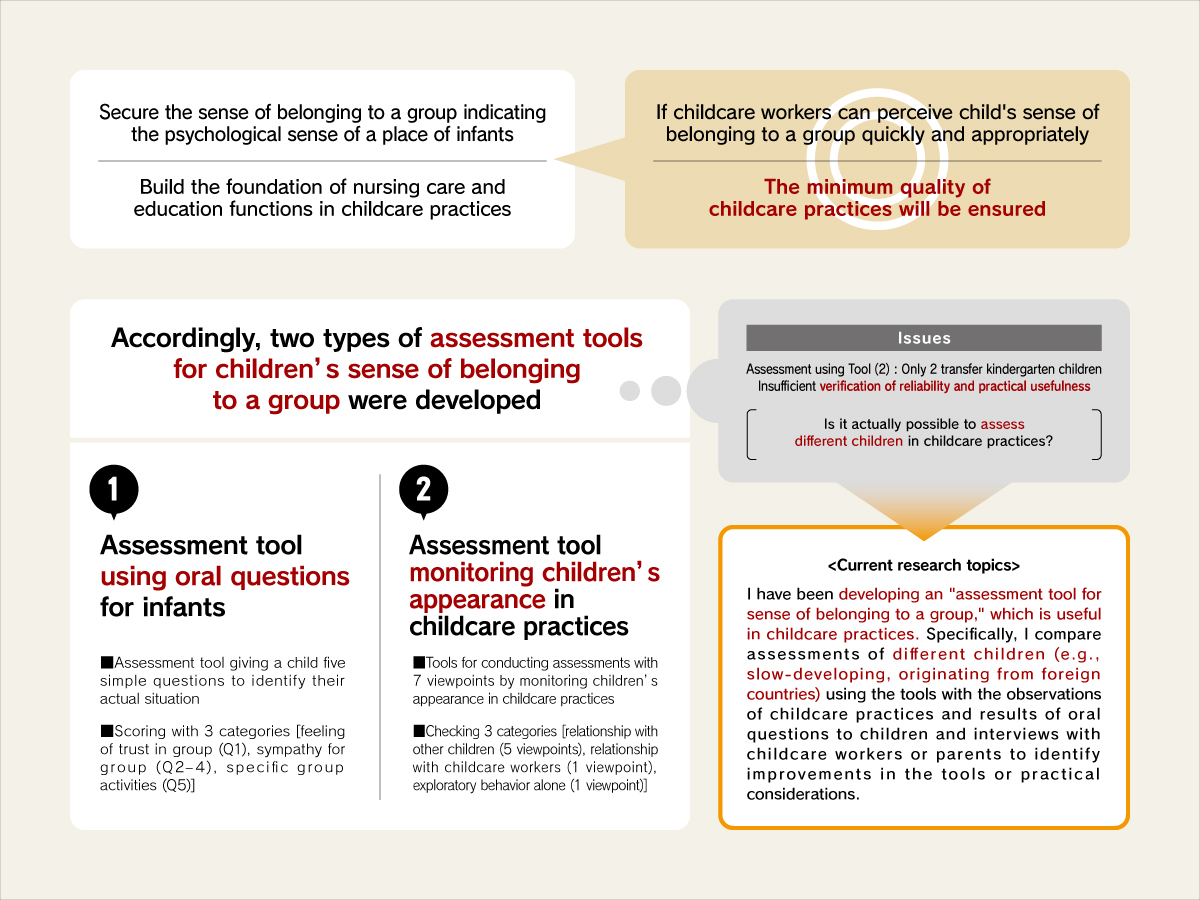Study of grouping that cherishes the "sense of belonging" of infants in childcare practices

Research overview
Studying infants’ sense of belonging to improve the quality of grouping My research aims to grasp the actual situation of infants’ sense of belonging.
I am doing research on the quality of grouping of infants in childcare practices. Whether or not an infant leading a group life in a childcare facility feels that they have “a place” in their class group has a significant impact on their emotional stability. An infant feeling that they have “no place” is living alienated from others at all times. A childcare worker is requested not to ignore such an infant but to take appropriate measures.
■ Key to future childcare practices is "sense of belonging."
While it is often stressed how important “helping a child to find a place” is in the process of development of a child, my research is based on the viewpoint of the sense of belonging necessary for building a human relationship, instead of an ambiguous, wide meaning of a place.
The sense of belonging is an unfamiliar concept in Japan, although it has already been introduced into the childcare policy of a multiethnic country, for example New Zealand. I am in the opinion that using the concept of sense of belonging will improve the quality of childcare practices in the examination of the future inclusive childcare and multicultural symbiosis childcare in Japan as a country that is becoming racially diverse year by year.
■ Developing an assessment tool usable in childcare practices.
While my research greatly depends on the actual situation of survey on infants. This method has proven very difficult because there are only a few researchers in Japan who examine childcare practices from this viewpoint and because it is difficult to conduct an interview with an infant who is immature in verbalizing their emotion and emotional control. I had a polite interview with a lot of infants and childcare workers and observed the infants’ language to make my research more reliable and more careful.
Based on aggregation of my research, I am making efforts to develop two assessment tools for identifying infants’ sense of belonging to a group.
This assessment tool has two purposes:
The first is, through an approach to children, to more accurately grasp the status and actual situation of the minds of children.
The second is, through an approach to childcare workers, to give them a hint by putting to words an invisible sense of belonging, thereby improving the quality of childcare and grouping practices.
Upcoming challenges include further verifying the credibility and usefulness of the assessment tool. As one of methods to achieve these goals, I am focused on a group childcare site where a variety of children live together who seem unlikely to have a sense of belonging, including slow-developing children and children in various cultures who have come to Japan from foreign countries, and I am now doing research for grasping their sense of belonging to a group.
I think that, on the background of the Japanese society that is getting diverse in terms of nationality and environment, a growing number of children need a support from dual aspects, that is, children who are slow-developing and rooted in a foreign country. I am also focused on their sense of belonging and participate in joint research on its fact-finding survey.
Message
The concept of "Belong" has already been introduced in a childcare policy of a multiethnic country such as New Zealand. In such a country, it is an important issue to build a symbiosis society of people with a variety of senses of value. This is why the concept of Belong has been used starting with preschool education. I am in the opinion that, in future, using the concept of Belong in the examination of the Japanese inclusive childcare and multicultural symbiosis childcare practices would help improve the quality of childcare practices. As a first step of that approach, I am making efforts to grasp childcare practices in Japan from the viewpoint of Belong.
Main publications
- NAGURA Kazumi (2023) Verification of usefulness of an assessment tool related to Infants' sense of belonging to a group: From the analysis of changes in a 5-year-old transfer child's sense of belonging to a class group. Study of Hoikusha Education. 7, 25-35.
- NAGURA Kazumi / YOSHIDA Shinji (2018) Study of infants' sense of belonging to a group in childcare practices: From the interview survey with 5-year-old children before kindergarten graduation. Human Education and Welfare,7, 47-59.
- NAGURA Kazumi / NII Kimiko (2018) Fact-finding survey of kindergarten entry status of infants who are suspected slow-developing and rooted in foreign countries and support system: In Eastern and Western Aichi Prefecture. Study of Infant Education, 27, 23-33
- NAGURA Kazumi (2018) A study of grouping of infants in childcare practices. Studies in Subject Development,(6),189-195.
- NAGURA Kazumi (2017) Effects expected by childcare workers through mutual growth childcare practices of 5-year-old children: Focusing on "social self-regulation capability" and "sense of belonging to a group." (5), 33-42.






